- Colection of 65 PHP scripts for $4.29 each
PHP is the programming language used by the most popular content management systems (CMSs) in the world: WordPress, Drupal, and Joomla, for example. In fact, it’s used by 78.1% of all the websites whose server-side programming language we know.
But even with the simple yet powerful PHP programming language, building a website or web application from scratch requires skill, experience, and time. Luckily, it’s much easier if you’re using a PHP framework.
PHP frameworks have many benefits that PHP developers have been enjoying for years already and they are a great way to kickstart your coding project.
In this post, we’ll take an in-depth look at PHP frameworks, including why you should use one, and what to look for when choosing. We’ll also talk about the PHPJabbers’ framework and find out what the most popular PHP frameworks are that you should consider for your web application development project in 2022.
Let’s get started!
What Is a PHP Framework?
Simply put, a PHP framework is a platform for building PHP web applications. With a PHP framework, you get access to a code library that usually includes commonly used functions, classes, and components. These can greatly reduce the amount of code you need to write yourself.
On top of that, there are many other benefits to using a PHP framework. But all in all, they let you skip the more repetitive coding tasks and focus on the big picture of PHP application development.
Why Use a PHP Framework?
If you decide to use a PHP framework in your app development project, you’ll be able to benefit in many ways. Of course, the specific upsides depend on the framework you choose. But there are some common pros that using any PHP framework will offer.
Let’s take a look at how you can benefit:
1. Speed Up the Development Process
Thanks to the built-in libraries and tools that each PHP framework has, you’ll require much less time to complete the project.
2. Write Less Code
Following from the previous point, if you use the built-in components and functions included in a PHP framework, you can reduce the amount of code you manually write. Thus, you can also reduce the number of errors in your code.
3. Improve Performance
The code that comes with PHP frameworks has been battle-tested and optimized. This means you’ll be able to build a high-performance PHP application, regardless of your own skill in writing performant code.
4. Avoid Repetitive Tasks
There are many common tasks that developers might face with every development project, like validation, data cleaning, or authorization. Luckily, these can be solved with the help of the built-in tools that each PHP framework offers.
5. More Secure by Default
Most PHP frameworks also include security measures, like protection against cross-site scripting and SQL injection attacks, etc. This means you’ll have less to worry about compared to when you code everything from scratch yourself.
6. Ensure Best Practices
As PHP frameworks are developed for use by a wide audience, they follow the best coding practices and naming conventions. When you use a PHP framework, you can ensure your application is maintainable and clean.
7. Better Collaboration With Coworkers
Because PHP frameworks follow best practices and generally also include thorough documentation, it will be easier to collaborate with other developers and not waste a lot of time trying to get on the same page.
8. Easier to Maintain
In the end, applications built with PHP frameworks are easier to maintain. This is thanks to their clean code, in-depth documentation, and also the fact that the most popular PHP frameworks themselves are being regularly maintained by their developers.
Ultimately, using a PHP framework helps standardize the development process and reduce the total project completion time. Thus, it can be beneficial for your business and help increase ROI.
Next, let’s find out what you should take into consideration when trying to find the best PHP framework for your web development project.
What to Look for in a PHP Framework?
With so many great PHP frameworks out there, how do you know which one is best for your project?
Here are some of the things you should take into account when choosing a PHP framework.
- Purpose – What is the particular PHP framework built for? Is it meant for high-performance projects or lower-scale web apps? Does it offer the testing, caching, and security features or components that you need?
- Popularity – PHP frameworks are often open-source and community-driven. The larger the community, the more likely the framework will still be developed and maintained in a few years.
- Scalability – If you have plans to scale your web application in the future, you should choose a PHP framework that will be able to handle your growing demands both in terms of performance and functionality.
- Ease of use – Is the PHP framework easy to learn and use? How user-friendly and thorough is the documentation? Especially if you’re a beginner in PHP, you should choose an easy-to-use framework with great documentation.
- Support – If you need support or help, how easily can you find it? With many frameworks, you can post questions on Stack Overflow, Reddit, GitHub, Slack, or even social media. Premium support tends to be rare so getting help often depends on the size of the community.
- MVC architecture – MVC stands for Model-View-Controller. This is a software design pattern that can make it much easier to develop scalable and extensible web applications while also making the process faster on the whole.
In the end, it’s useful to test out several PHP frameworks that seem like a good fit for your project. Only real hands-on experience will tell you how suitable the framework is and how comfortable you feel working with it.
The PHPJabbers PHP Framework
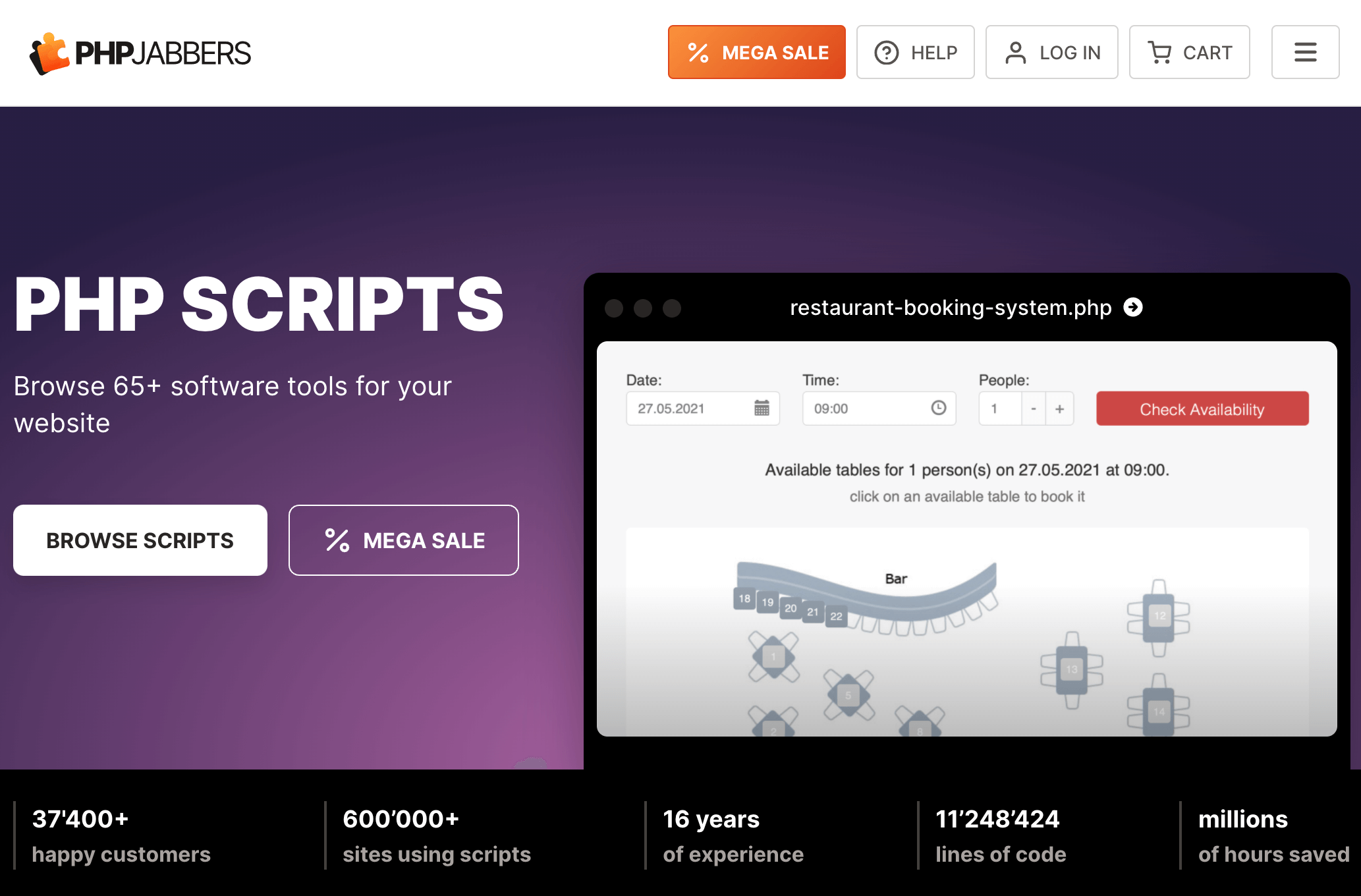
At PHPJabbers, we have developed our own PHP framework to get the tailored fit that our custom PHP scripts require. Thanks to this framework, our scripts offer great user experience, high performance, and they are fully customizable with the Developer License.
Here’s a quick overview of the PHPJabbers PHP framework:
Model-View-Controller Architecture
All our scripts follow the MVC architecture model. This way, you can easily customize our scripts to fit your specific needs, regardless of whether you want to change the front end or the back end.
On top of that, if you request any custom development from our team, we’ll be able to complete the job quickly, as using a PHP framework helps speed up the development process.
Easily Customizable PHP Scripts
With the help of the MVC model, customizing the front end and back end of our scripts is a breeze. According to the folder and file structure of our framework, all the front-end code is located in one place. The CSS file can be edited with any license, but in order to customize the software features, you’ll need a Developer License.
Thorough Documentation
Both our scripts and PHP framework are easy to use. The basics of our PHP framework are explained more in detail in this introductory blog post. If you’d like to get to know more about it, simply let us know and we’ll send you the whole documentation. However, even without the docs, making changes to our scripts is easy. And in case you should get stuck, our support is here for you.
Universal Plugins
For the most popular functionalities we use different plugins. For example, the PayPal plugin is included as the default payment gateway with all our PHP scripts that require a payment module. So, you can use any number of our scripts without any compatibility problems.
Easy-to-Edit Components
Most of the code that’s used several times within a script has been gathered in one place, the folder titled components. This way, if you need to modify the code, you’ll only need to edit it once.
Based on these features of our PHP framework, we offer a wide set of ready-made PHP scripts. Sometimes, instead of learning a whole new PHP framework, it makes more sense to get a fully working PHP script with the functionality that you need, or have the custom development job done for you. Feel free to take a look at all our PHP scripts – maybe you’ll already find what you need.
7 Best PHP Frameworks in 2022
By now, you should have all the background info to help you find the right PHP framework for your development project.
Below, we have listed the 7 best PHP frameworks that are all great choices in 2022. The list has been assembled based on community size, ease of use, support and documentation, versatility of features and packages, and security. All the frameworks are free to use and open source.
Let’s dig in!
1. Laravel
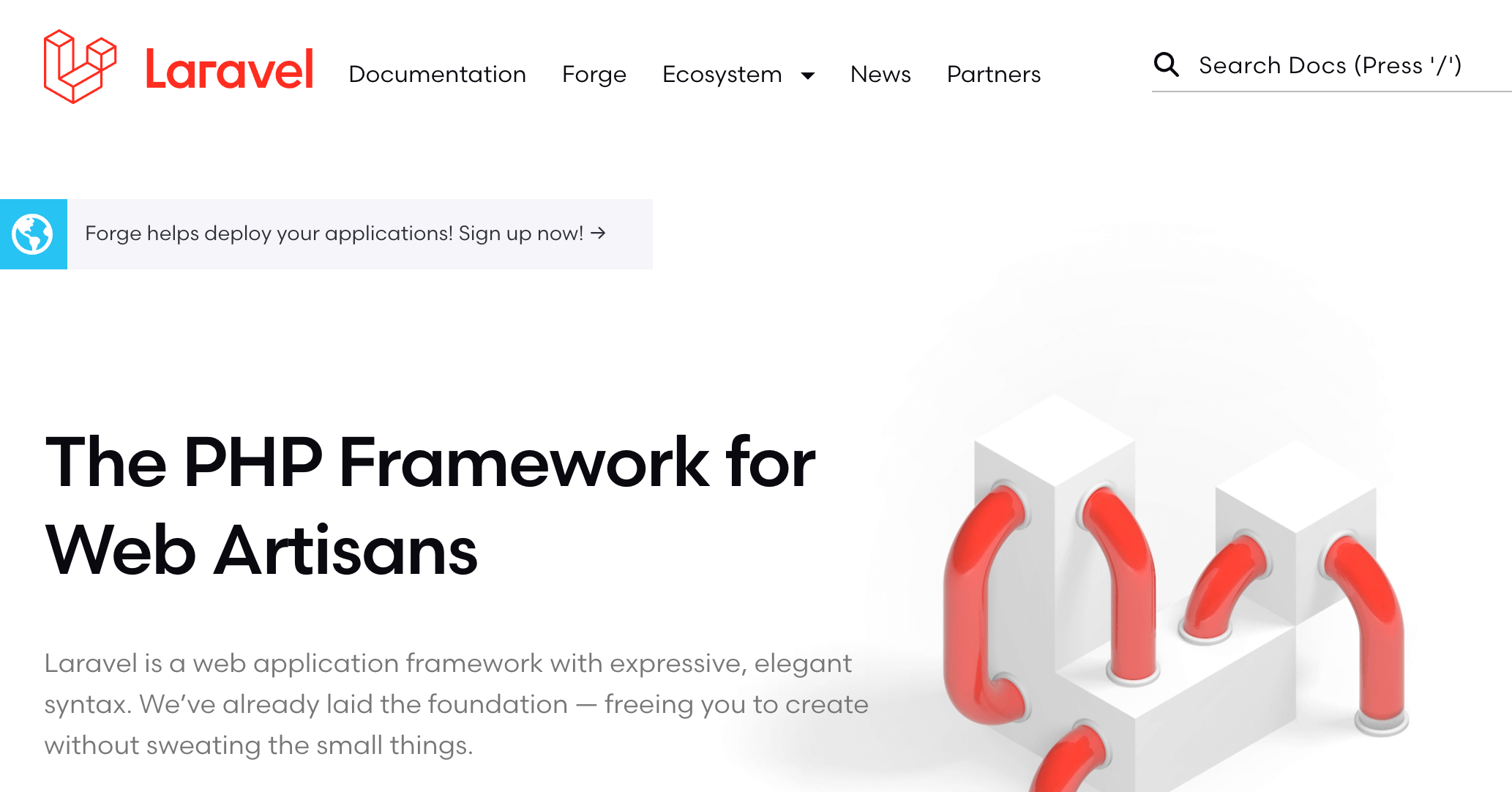
Quick stats
Launched in 2011
Latest version: 8.16.1
Total live websites: 705,575
GitHub stars: 67,000+
Laravel is a full-stack PHP framework that uses the MVC architecture model and it’s actually based on components from the Symfony framework.
One of Laravel’s core strengths is offering an amazing developer experience by simplifying common tasks used in most web projects, like authentication, routing, and sessions. Their official Vagrant box, Laravel Homestead, offers a full development environment that removes the need of installing any other server software on your computer. You’ll also get unit and integration testing, queues and scheduled jobs, built-in support for caching systems, and a debugging package, Laravel Telescope, among other great features.
In addition, Laravel has a whole ecosystem of first-party packages, plus lots of third-party add-ons for different development purposes available on Packagist. These, combined with Laravel’s extensive knowledge base that offers guides and video tutorials, make it a great PHP framework for both beginners and more demanding users.
There’s also a really large community around Laravel, with thousands of contributors and over a million users on GitHub.
All in all, Laravel is easy to learn and to use and it’s probably the best PHP framework for projects with demanding enterprise and B2B needs, or heavy-traffic websites.
2. Symfony
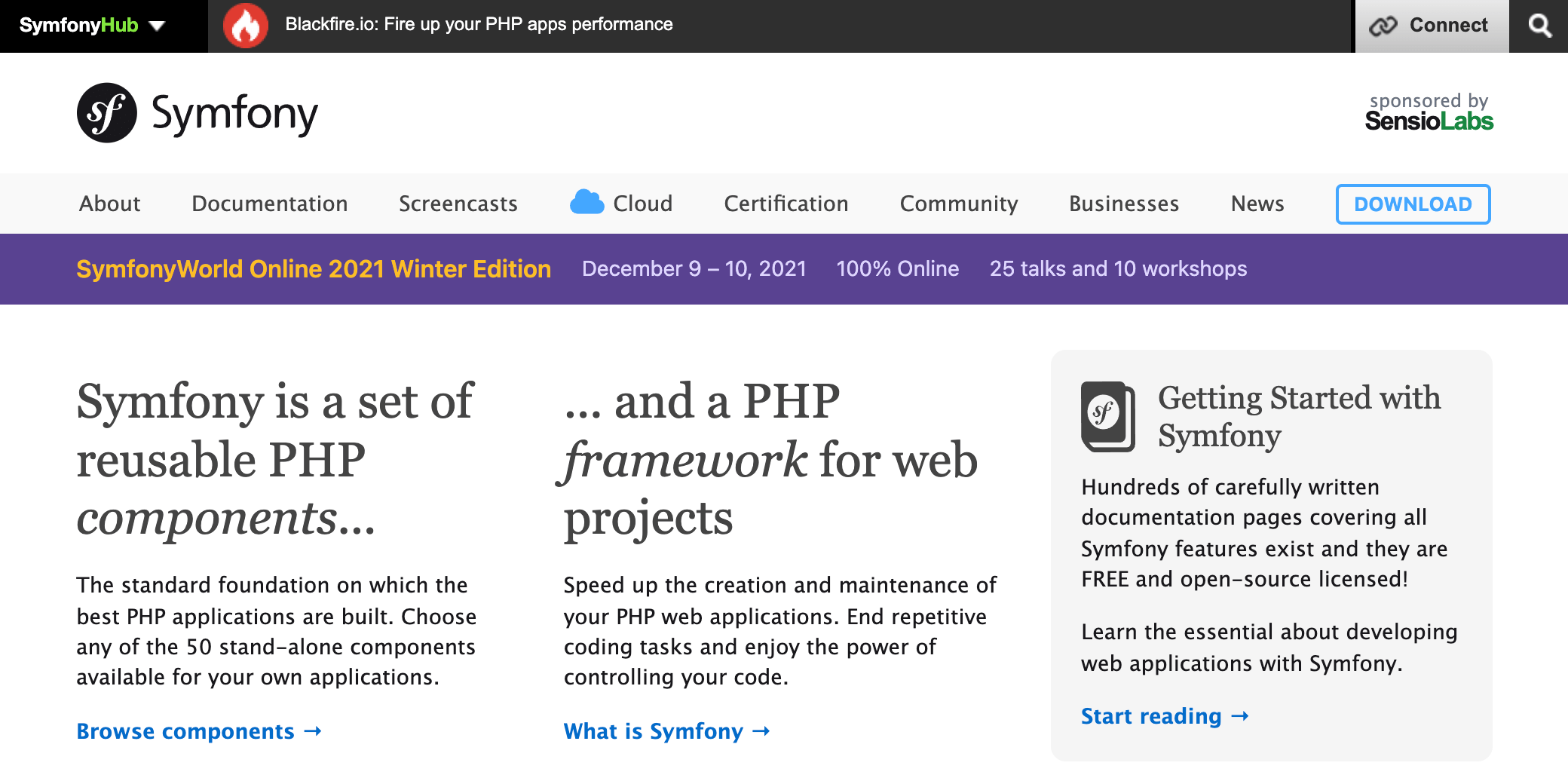
Quick stats
Launched in 2005
Latest version: 6.0.0
Total live websites: 52,049
GitHub stars: 26,000+
Symfony is a PHP framework that offers a set of 50 reusable PHP components that you can build your application with. Symfony is open-source, highly customizable, and it’s based on the MVC model.
Currently, Symfony has over 3,000 contributors, 600,000+ developers, and more than 200,000,000+ monthly downloads. These large numbers are a testament to Symfony’s flexibility and versatility. The framework supports many different databases, easy debugging with a built-in toolbar, authentication and authorization features, unit testing, and the Twig templating engine.
When it comes to support, Symfony has a large community that can offer open-source support through GitHub discussions or Slack. In addition, there’s professional paid support via SensioLabs. Luckily, Symfony’s documentation includes lots of thorough guides and resources, which can be helpful for beginners. Still, there’s quite a lot to take in, so it can take a bit of time to get started.
According to their philosophy, Symfony embraces and promotes professionalism, best practices, standardization, and interoperability of applications. It was designed by professionals for professionals as a pragmatic tool. So, Symfony is definitely a great PHP framework, but it’s probably better for more experienced developers and a great fit for large-scale websites and web apps.
3. CodeIgniter
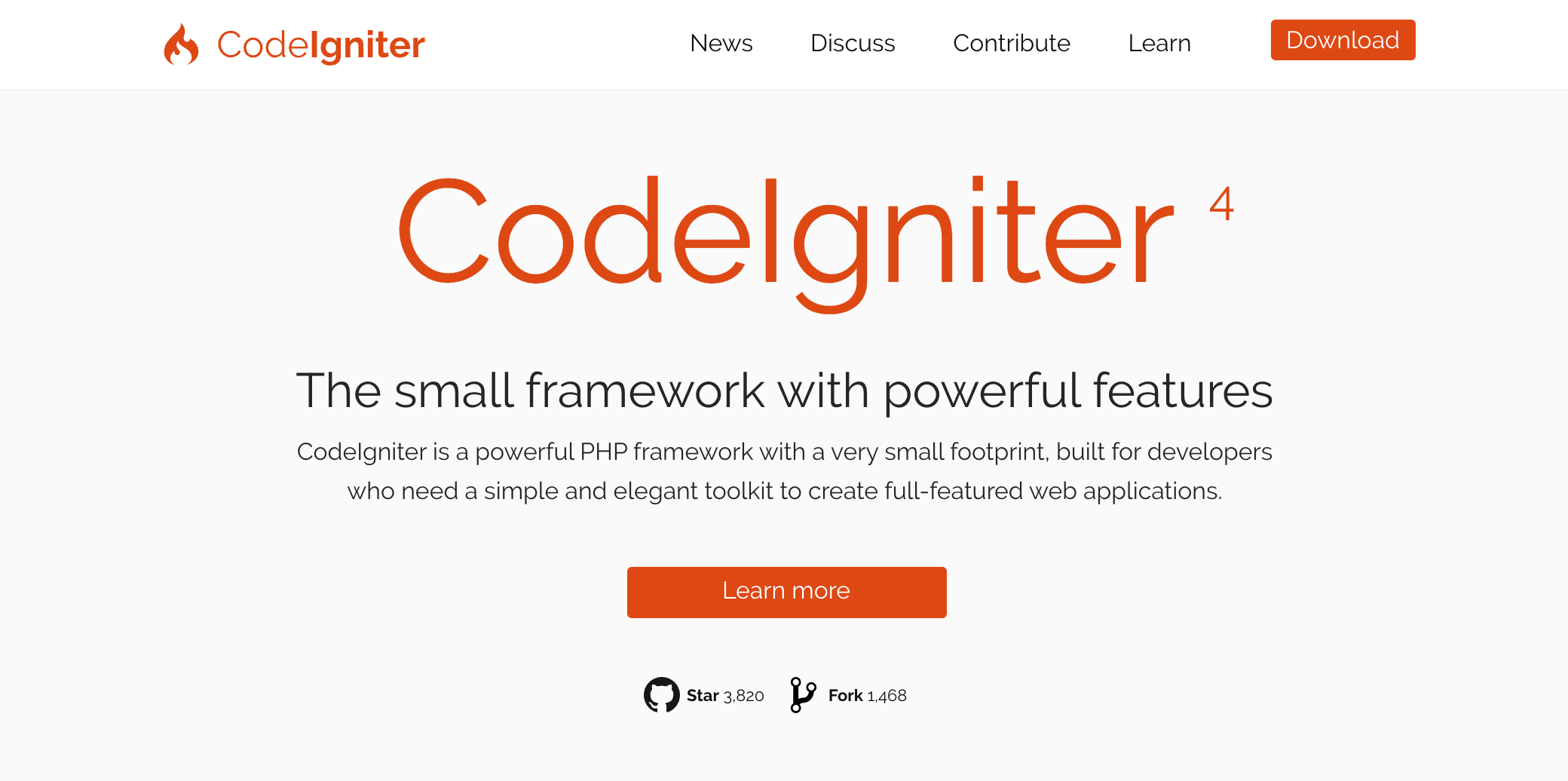
Quick stats
Launched in 2006
Latest version: 4.1.1
Total live websites: 534,179
GitHub stars: 18,000+
CodeIgniter is a high-performance open-source PHP framework with a small footprint and minimal configuration. Thanks to the lightweight architecture and simple solutions, CodeIgniter is famously fast. When using CodeIgniter, following the MVC model is optional but encouraged.
Despite being lightweight, CodeIgniter offers some great features. There’s built-in framework and application testing, great error handling, as well as web page and HTTP caching. On top of that, CodeIgniter has some useful built-in security measures. These include protection against cross-site scripting (XSS) and cross-site request forgery attacks, context-sensitive escaping, and Content Security Policy (CSP). All the existing functionality can be expanded thanks to the several hundred packages that are available on Packagist.
CodeIgniter is an excellent choice for beginners because it’s easy to use and learn and it has clear documentation with lots of examples. If you run into any trouble, you can rely on the community and get help through the CodeIgniter forum or Slack channel.
So, if you’re looking for a PHP framework for developing lightweight high-performance applications, you should definitely take a closer look at CodeIgniter.
4. Laminas Project (previously Zend Framework)
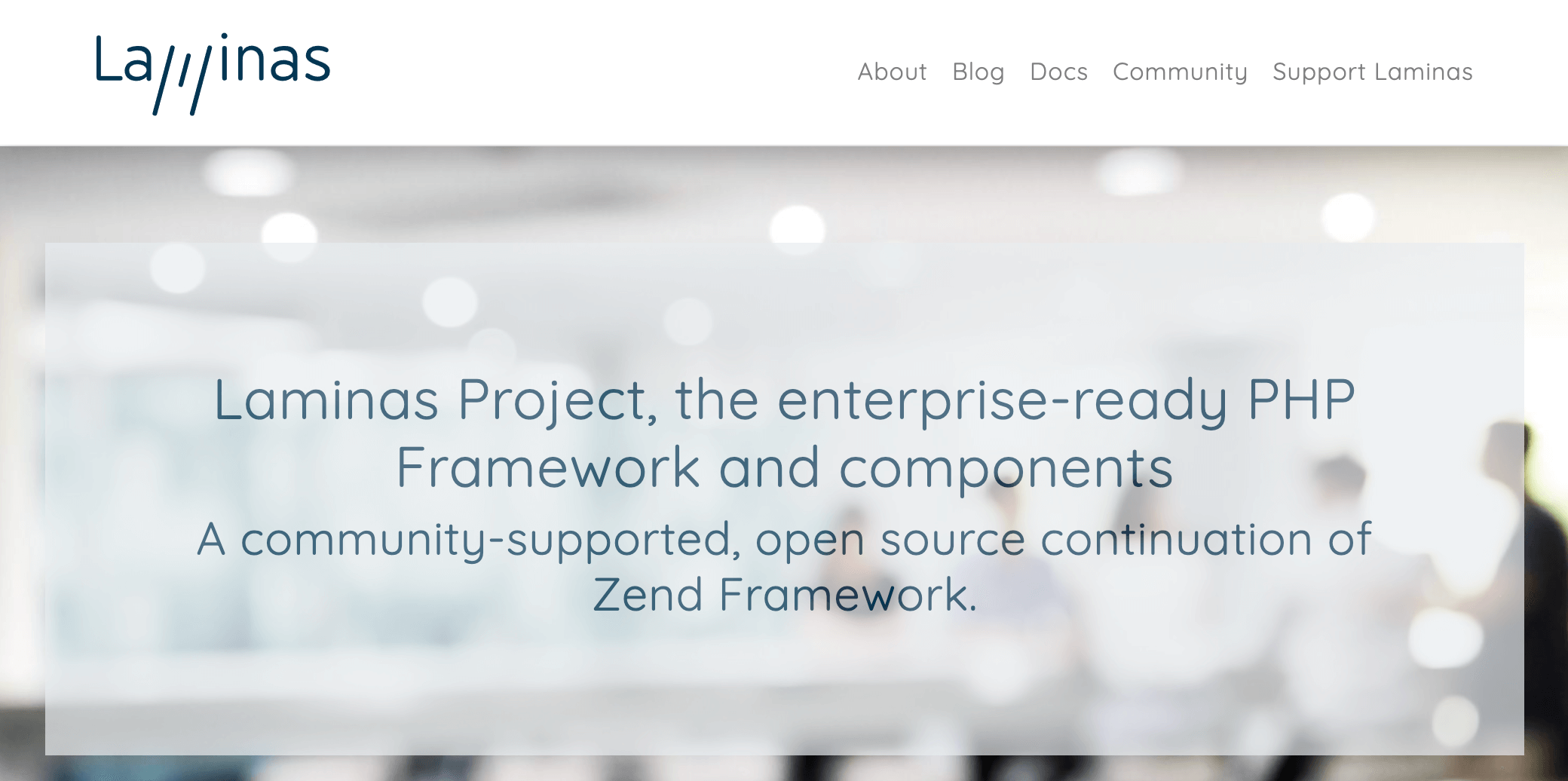
Quick stats
Launched in 2006, renamed to Laminas in 2019
Latest version, Laminas: 1.3.0
Zend Framework: 3.0.0 (inactive)
Total live websites: n/a
GitHub stars (Zend): 5,000+
GitHub stars (Laminas): 114
The Laminas Project is the community-supported continuation of the Zend Framework – a component-based open-source PHP framework designed for enterprise use. Laminas has the exact same codebase as Zend Framework did, which means it’s flexible, object-oriented, and MVC-based.
With Laminas, it’s possible to use only the components you need in your web app. You can choose from a wide array of features that includes dependency injection, input filtering and validation, navigation and pagination, authentication, feed generation, and many more. And with the help of the hundreds of packages available on Packagist, you can easily add even more functionality to your development project. The Laminas framework also lets you build RESTful APIs and PHP middleware applications according to the PSR-7 and PSR-15 specifications.
The documentation provided by Laminas is really thorough, although perhaps somewhat complicated for beginner-level users. For support, you can reach the community via online forum, Slack channel, or Discord chat.
Laminas is a great option for fast component-based development, or for high-complexity enterprise use and mobile applications.
5. Yii
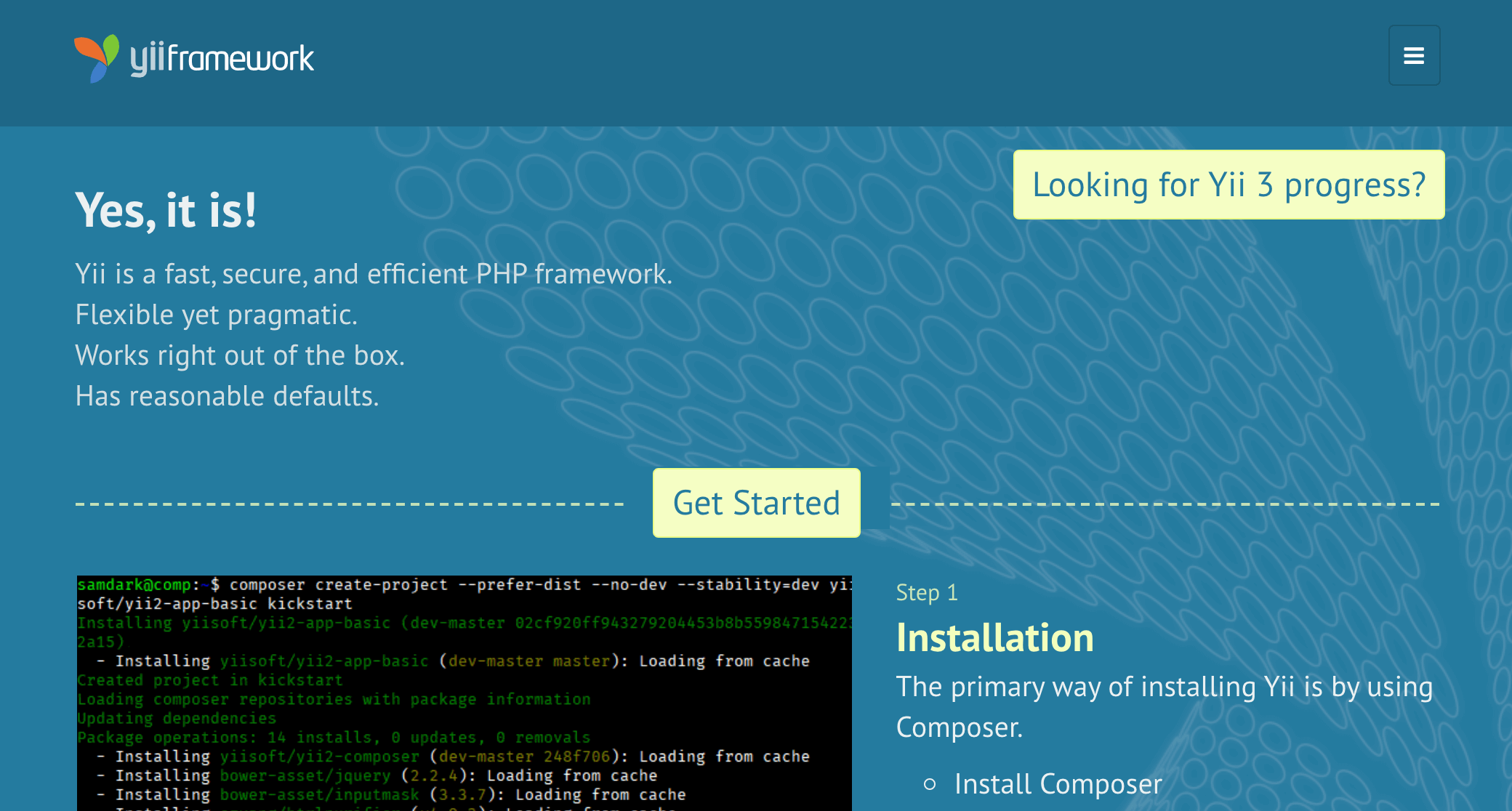
Quick stats
Launched in 2006
Latest version: 2.0.43 (Yii 2)
Total live websites: 154,609
GitHub stars: 13,000+
Yii is a fast, secure, and professional PHP framework that offers highly customizable PHP components. It’s open-source, object-oriented, and follows the MVC architecture model. Yii promises that developers will write more code in less time.
The Yii Framework, currently at version 2 and thus called Yii 2, has some great features like their simple but powerful APIs and the fast Gii code generator. Several caching methods are available, including data caching and page caching.
For security, Yii offers authentication, authorization, password hashing, encryption, and more. If you follow the best practices from their documentation, you can also prevent SQL injections and XSS and CSFR attacks. In fact, Yii’s well-written documentation includes lots of tutorials and best practices that are also suitable for beginners, although there’s still quite a steep learning curve.
You can find thousands of packages for Yii 2 on Packagist. And it also works well with third-party code, like PEAR or the Laminas Project.
Yii has quite a large community and you can get live support through IRC and Slack. Or, you can post questions on Yii’s official forum, Facebook Group, Twitter, StackOverflow, or Reddit. Support is also available in Russian, Ukrainian, and Indonesian.
All in all, Yii is a great general-purpose PHP framework. Thanks to high performance and tight security, it’s very suitable for ecommerce projects.
6. CakePHP
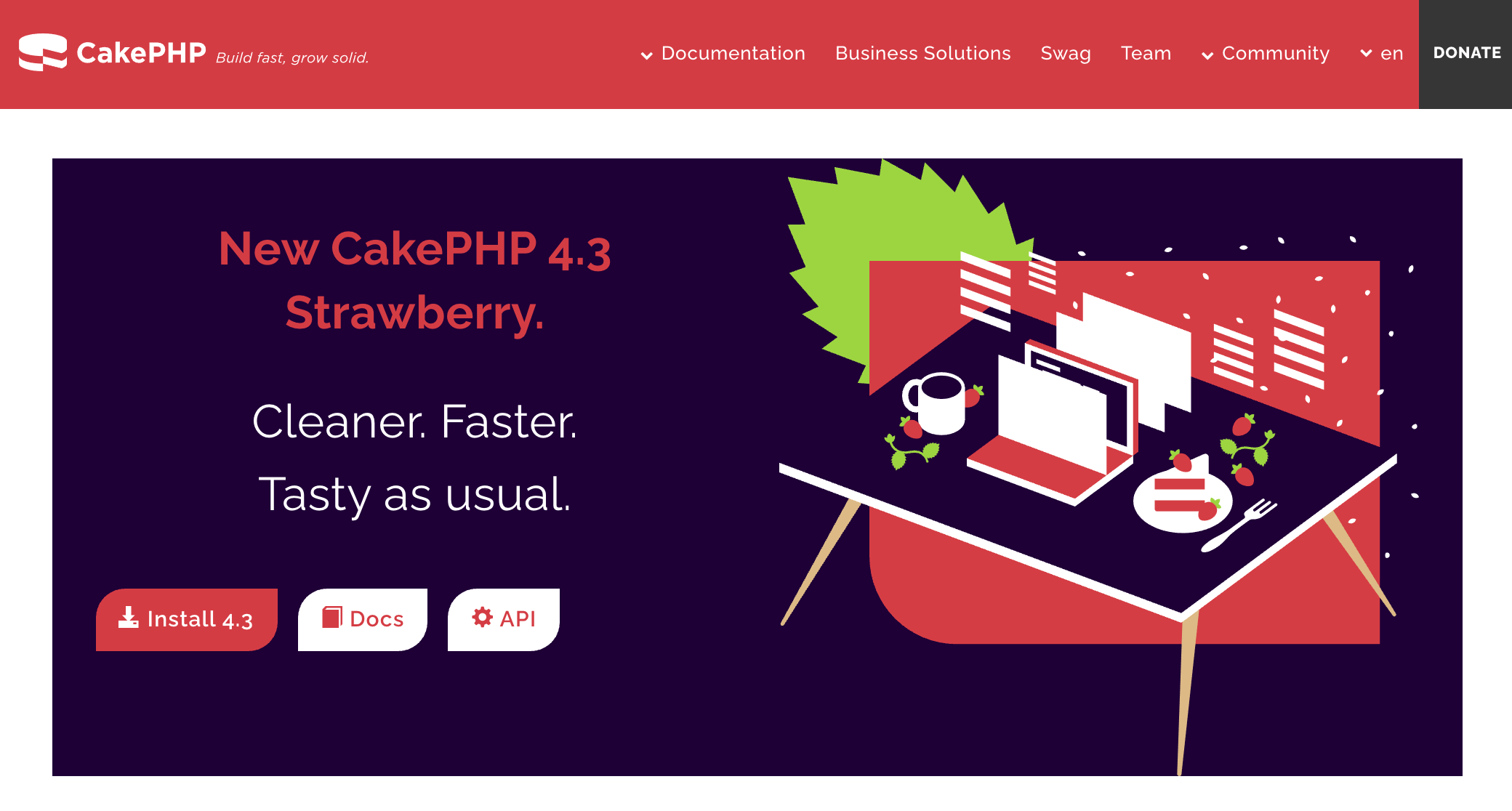
Quick stats
Launched in 2005
Latest version: 4.3.2
Total live websites: 64,397
GitHub stars: 8,000+
CakePHP is an open-source PHP framework that follows the MVC design approach. It lets you build an app or prototype quickly thanks to its code generation and scaffolding features. The setup is also very simple with no configuration needed – just connect your database and you’re good to go.
If you install CakePHP, you’ll get many built-in features like translations, database access, caching, validation, authentication, etc. There are several default security tools as well, like input validation, CSRF protection, form tampering protection, and protection against SQL injections. On top of those, CakePHP has a built-in object-relational mapping (ORM) tool, a routing and reverse routing system, and automatic pagination. Moreover, CakePHP has several useful first-party and third-party plugins, like Bake that lets you automatically generate code.
As a service that’s quite rare among PHP frameworks, CakePHP offers official premium support, training, and consultancy. Still, you can get by on your own thanks to the documentation that’s very thorough and reads well – it’s also suitable for beginners, and it’s nicknamed the Cookbook. Community support for Bake is great, too. You can get help on Slack, IRC, Stack Overflow, and CakePHP forums.
On the whole, CakePHP is easy to use and its’ great for rapid prototyping and commercial applications due to it’s MIT License and security features.
7. Phalcon
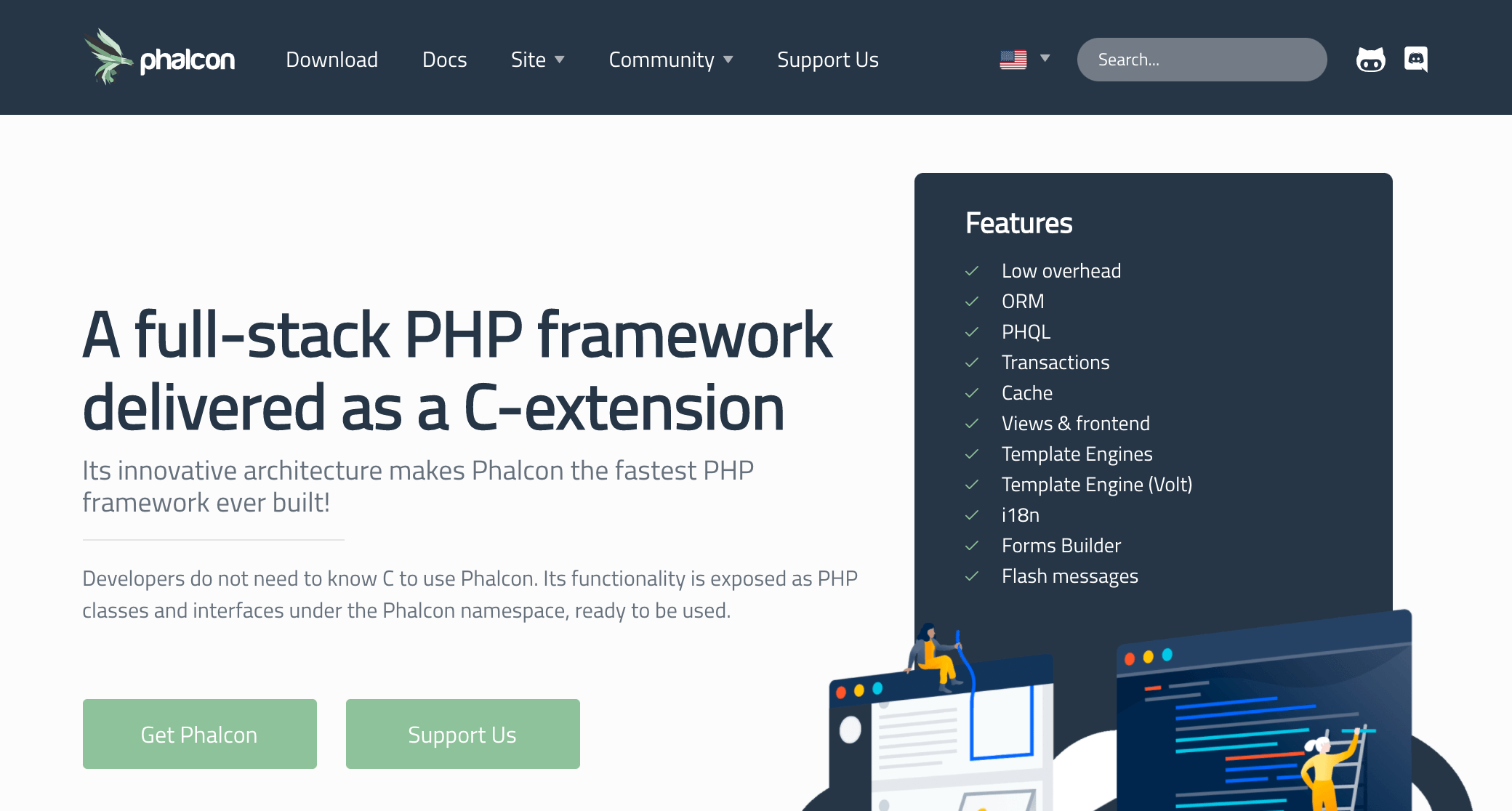
Quick stats
Launched in 2012
Latest version: 4.1.2
Total live websites: n/a
GitHub stars: 10,000+
Phalcon is an open-source PHP framework that’s written as a C extension. It’s a high-performance, full-stack framework that aims to maximize execution speed, save on resource usage, and handle a larger number of HTTP requests per second than their competitors. To use Phalcon, you won’t have to know any C.
As mentioned, Phalcon functions as a web server extension and it has very low overhead. The framework offers MVC and HMVC (hierarchical model-view-controller) architecture, modules, components, dependency injection, autoloader, and routing features. You can also easily write REST servers and applications. The Phalcon framework is secure thanks to password hashing and protection against CSFR attacks.
The documentation provided by Phalcon is quite easy to understand and thorough including several tutorials. You can get support from a supportive community through official forums, Stack Overflow, Discord, several social networks, and GitHub discussions.
Phalcon is a good framework to use for customizable web apps with enterprise needs, and in general, super fast websites.
Conclusion
A PHP framework is a great tool kit for your web application development project. In short, using one helps you save time, ensure better performance and security, avoid repetitive coding tasks, and keep the project easier to maintain as PHP frameworks follow best practices by default.
By now, you should have a good idea of how to choose the best PHP framework for your web development project.
But just in case, here’s a quick recap:
- The best options for beginners are Laravel and CakePHP.
- For large-scale enterprise websites and applications, consider Laravel or Laminas.
- The most suitable option for ecommerce is Yii.
- More experienced developers could really benefit from Symfony.
- Lightweight and high-performance applications are best built with CodeIgniter and Phalcon.
- CakePHP is the best for fast prototyping.
In the end, you should try out a few different frameworks, starting with reading the documentation. This way, you can get hands-on experience with each PHP framework and see which feels best to you. And remember, you can always turn to PHPJabbers for ready-made PHP scripts and custom development work.